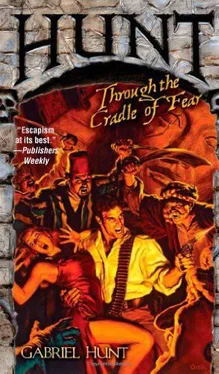Gabriel Hunt - Hunt Through the Cradle of Fear
Здесь есть возможность читать онлайн «Gabriel Hunt - Hunt Through the Cradle of Fear» весь текст электронной книги совершенно бесплатно (целиком полную версию без сокращений). В некоторых случаях можно слушать аудио, скачать через торрент в формате fb2 и присутствует краткое содержание. Год выпуска: 2011, Издательство: Dorchester Publishing Co., Inc., Жанр: Старинная литература, на английском языке. Описание произведения, (предисловие) а так же отзывы посетителей доступны на портале библиотеки ЛибКат.
- Название:Hunt Through the Cradle of Fear
- Автор:
- Издательство:Dorchester Publishing Co., Inc.
- Жанр:
- Год:2011
- ISBN:нет данных
- Рейтинг книги:3 / 5. Голосов: 1
-
Избранное:Добавить в избранное
- Отзывы:
-
Ваша оценка:
- 60
- 1
- 2
- 3
- 4
- 5
Hunt Through the Cradle of Fear: краткое содержание, описание и аннотация
Предлагаем к чтению аннотацию, описание, краткое содержание или предисловие (зависит от того, что написал сам автор книги «Hunt Through the Cradle of Fear»). Если вы не нашли необходимую информацию о книге — напишите в комментариях, мы постараемся отыскать её.
Hunt Through the Cradle of Fear — читать онлайн бесплатно полную книгу (весь текст) целиком
Ниже представлен текст книги, разбитый по страницам. Система сохранения места последней прочитанной страницы, позволяет с удобством читать онлайн бесплатно книгу «Hunt Through the Cradle of Fear», без необходимости каждый раз заново искать на чём Вы остановились. Поставьте закладку, и сможете в любой момент перейти на страницу, на которой закончили чтение.
Интервал:
Закладка:
Andras came forward, dragging Tigranes with him. He bent to pick up Gabriel’s gun.
“That’s a very nice weapon,” he said. “An antique, isn’t it? I think I’ll keep it.”
“You son of a—” Gabriel started, but Andras slapped him brutally across the face with the side of his Colt. He felt the slash on his cheek from DeGroet’s sword reopen and start bleeding again.
“Take them away,” Andras said, wiping Gabriel’s blood off the cylinder.
Chapter 14
They were being held in Anavatos’ tallest building, a three-story tower near the cliff’s edge that during the town’s heyday had been the site of an olive oil press, a church, and a school. Today it was an empty shell with a few unbroken benches the only reminder of its earlier functions.
From somewhere Andras’ men had found a pair of straight-backed wooden chairs, one with arms and one without, and Gabriel and Christos were tied to these, side by side. Tigranes was seated on the ground across the room, facing them, his hands free, his phorminx in his lap.
On a bench against one wall, Gabriel’s Colt lay, tantalizingly out of reach. Andras had placed it there deliberately, Gabriel figured. Just to make a point.
“Tell, old man,” Andras said, his Greek crude and heavily accented. He had a cell phone in his hand and, having dialed it a moment earlier, was holding it out in Tigranes’ direction. DeGroet was on the other end of the line, waiting silently.
When nothing happened, DeGroet’s voice spat from the speaker, thin but clear. “Kill one of them.”
“Which one?” Andras said.
“The Greek,” DeGroet said. “He wouldn’t care about Hunt.”
Andras nodded to the men standing behind Christos’ chair, and one of them drew a foot-long hunting knife from a scabbard at his waist. He held it to Christos’ throat.
“Don’t do it,” Gabriel said, in Greek, to the man. “He’s done nothing wrong. He’s one of you.”
“He chose his side,” the man muttered. His knife didn’t budge.
“Boy,” came DeGroet’s voice, “can you understand me?” His Greek was better than Andras’, though still accented.
“Yes,” Christos said.
“Tell the old man to begin reciting the poem about the sphinx or my men will cut your head off. Tell him that.”
“Tigranes,” Christos said. The old man looked over at him. “You heard what they want.” His voice trembled. “Don’t do it.”
“They will kill you,” Tigranes said.
“Lajos,” Gabriel called out, “you don’t need to do this. I know everything you want to know—I already got it out of him. Bring me to wherever you are and I’ll—”
“Oh, now you wish to cooperate. Imagine that. The great Gabriel Hunt, within an inch of losing his life at last, and now he wants to make a deal. Well, no. I think not. You had your chance—plenty of chances. No more deals. Andras?”
“Yes,” Andras said.
“Start a little at a time,” DeGroet said in Hungarian. “Cut off the boy’s hand. Then the other, then a foot. We’ll make the old man talk.”
Andras nodded again to the man with the knife and explained partly through gestures what DeGroet wanted. It wasn’t a difficult message to convey.
Gabriel, meanwhile, was straining against the ropes holding him to the chair. There was one around his wrists and another tying his ankles to the front legs, and both were taut and unyielding. With enough time and privacy he might be able to introduce some slack, work the knots apart, maybe even inch over to the wall and work the ropes against the rock till the fibers came apart—but time and privacy were two things he didn’t have.
One of the men untied Christos’ arms and then held them pinned to the wooden arms of the chair. The other, the one with the knife, said to Christos, “You right-handed or left? I’ll do the other first.”
“No,” Tigranes said. “No. I cannot sit by while this boy is maimed or killed. Not when all you wish is to hear my poems. I will play.” Angrily, he strummed his instrument, and the melody that arose sounded dark, martial.
“There,” DeGroet’s voice came from the cell phone. “You see?”
“ Raise your voice in song, O goddess, ” Tigranes intoned, “ and tell of Peleus’ mighty son, Achilleus, who rained misery untold upon the brows of his fellow Achaeans. Many a hero among them was laid low and brought to Hades, their flesh made carrion for the beaks of vultures and the jaws of wild dogs upon the blood-drenched plains of Troy —”
DeGroet interrupted, his voice blasting from the tiny speaker in Andras’ hand: “Troy? Troy? I don’t want the Iliad, you old fool, I want the sphinx—”
“I am very sorry,” Tigranes said, his voice soft, his music stilled, “but I am, as you say, old. My memory is not what it was. I cannot enter the old tales anywhere I wish, or that you might wish—I can only remember them from the beginning.”
“You’re joking,” DeGroet said.
“From the beginning,” Tigranes repeated. “And that means I have to start on the plains of Troy. And if I am interrupted, I will have to return to the plains of Troy once more, and start over again. From the beginning.”
“I will have them kill the boy!” DeGroet shouted.
“You can kill whomever you wish,” Tigranes said. “Him, me, yourself. But it will not change the fact that I can only tell the stories in one way: from start to finish, in their proper order.”
DeGroet uttered an oath, a fevered Hungarian profanity. The language was rich with them.
“All right,” he said finally. “Do it in whatever order you have to, but for god’s sake, do it quickly.”
“For the gods’ sake,” Tigranes said, “I will do properly. ”
“Just start already,” DeGroet said. “Andras—call me back when he gets to the sphinx.” And the connection was broken.
“You heard him,” Andras said, pocketing the phone. He looked around the room, the expression on his face making it clear that he’d have to be tied to a chair himself in order to sit through hours of Greek poetry being recited. “Start,” he said. “And you—” He pointed to the man with the knife. “Say me when he reaches the sphinx. I go up.” He strode out and they all heard his steps on the stairs.
“Sit, gentlemen, sit,” Tigranes said, gesturing to their captors, Greek men all, ranging in age from their late twenties to a few in what looked like their late fifties. “We will be here for a while, you may as well be comfortable.” Some of the men sat; some remained standing. Tigranes smiled at them. “You know that Homer himself was once a captive, a hostage—it is from this experience that he got his name, homeros. He had another name at birth. You did not know this?” He made a clucking sound with his tongue. “You should be ashamed to know so little of your own heritage.”
“Stop talking and begin reciting,” the man with the knife said. “We don’t want to be here all night.”
Tigranes shrugged. “As you wish.”
His fingers plucked at the strings.
Two hours later, Tigranes had reached the bedroom of Helen of Troy and all the men sat at rapt attention. Their eyes were on Tigranes as he sang of her treachery and sadness, of her lover, Paris, and his cowardice, of their dalliance between the sheets while men were dying for them by the score on the battlefield below. His hands alternated between plucking the strings of his lyre and waving in midair to accompany the vivid word pictures he was painting. His voice grew quiet during moments of grieving and loud for the bloody battles, sped up when events took an unexpected turn and lingered painfully when a hero’s fatal wounds bled into the Trojan soil.
Читать дальшеИнтервал:
Закладка:
Похожие книги на «Hunt Through the Cradle of Fear»
Представляем Вашему вниманию похожие книги на «Hunt Through the Cradle of Fear» списком для выбора. Мы отобрали схожую по названию и смыслу литературу в надежде предоставить читателям больше вариантов отыскать новые, интересные, ещё непрочитанные произведения.
Обсуждение, отзывы о книге «Hunt Through the Cradle of Fear» и просто собственные мнения читателей. Оставьте ваши комментарии, напишите, что Вы думаете о произведении, его смысле или главных героях. Укажите что конкретно понравилось, а что нет, и почему Вы так считаете.












